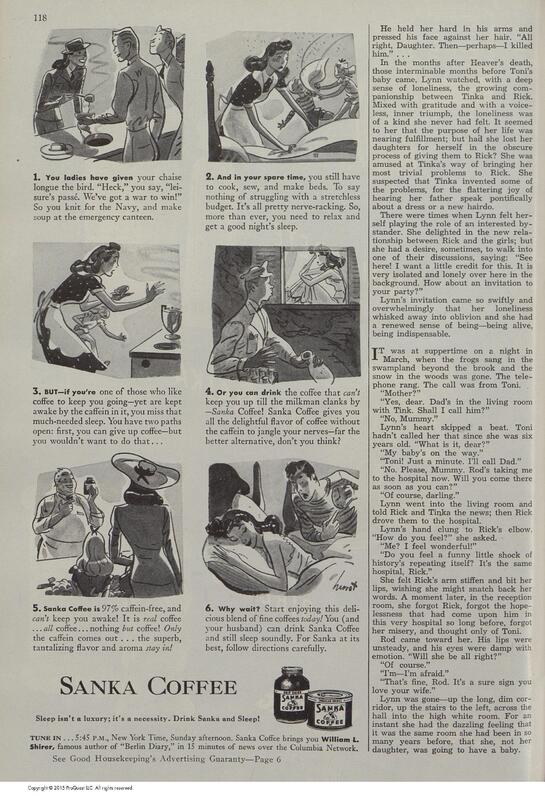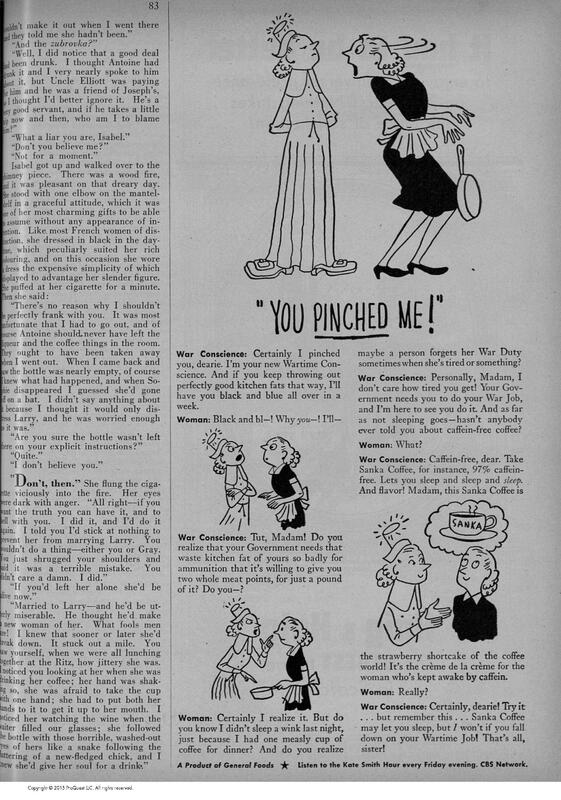During World War II: Women as Consumers (Sanka Ads)
Sanka coffee produced many ads during this time for their decaffeinated coffee. Sanka was one of the few advertisers in the archive I was searching that advertised decaffeinated coffee. This leads me to believe that Sanka was one of few producers who offered this product. While Pan American ads were working to sell coffee more generally, rather than a specific product, Sanka is advertising their own specific coffee. They often claimed that drinking their coffee allowed you to enjoy the taste of coffee without being kept up at night. In this ad, there are panels with different scenes, one woman being the main focus in each. In the first panel, the ad states, “‘Heck,’ you say, ‘leisure’s passé. We’ve got a war to win!’” Here, the ad highlights that a leisurely lifestyle isn’t fashionable. This woman proceeds to knit for the Navy and make soup at the emergency canteen. Women’s new wartime responsibilities are highlighted here. They had the added expectation during the war to volunteer for the war effort. Nancy Walker supports this in her research on women’s magazines, arguing that women’s wartime responsibilities were often in volunteer and domestic spheres (Walker 2001). The ad’s next panel states all of the household responsibilities she still has in her spare time, such as cooking, sewing, and making beds. She must also do all of this on a tight budget. Then the ad states that “if you’re one of those who like coffee to keep you going…” but it keeps you awake at night, it can prevent you from getting needed rest. Sanka coffee is 97 percent caffeine free, so they argue that if she drinks their coffee, she can enjoy it and get her rest which will allow her to perform her household responsibilities to a higher degree. In this ad, she is the consumer of Sanka coffee, but only to help her perform well in her roles as volunteer and homemaker.
Sanka advertisements continue to show that coffee advertisements during World War II emphasize their role in homefront responsibilities, and show that consuming their coffee can help them perform well in these tasks. This ad shows a woman with a “war conscience,” which is telling her she should be doing her “War Job.” The War Conscience scolds her for wasting kitchen fats, and the woman claims that she forgot her War Job because she was so tired. The War Conscience states that she is here to make sure she does her War Job and encourages her to try Sanka decaffeinated coffee. By drinking their coffee, Sanka claims that she will be able to perform their household duties more effectively. In this ad especially, coffee consumption is seen as a path for women to do best in what is expected of them. Furthermore, while it may seem interesting that Sanka is advertising decaffeinated coffee to women, they were additionally targeting male consumers, but due to my scope these advertisements are not included.
Overall, women’s portrayals as consumers of coffee worked to sell them their product to fulfill their “War Jobs,” not to be confused with the women who entered the workforce for paid labor. Women’s war jobs were not just the ones that Rosie the Riveter represented, rather they were encouraged through advertisements to follow through with government rationing policies, volunteer on the home front, and all the while maintain the home. It appears that while women’s roles in society quickly changed, advertisers still emphasized their responsibility to perform traditional roles.


